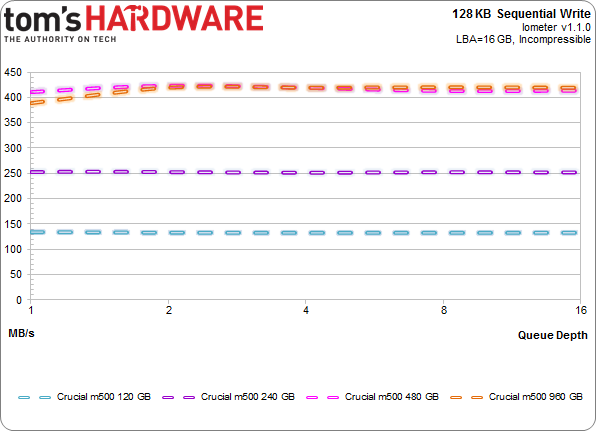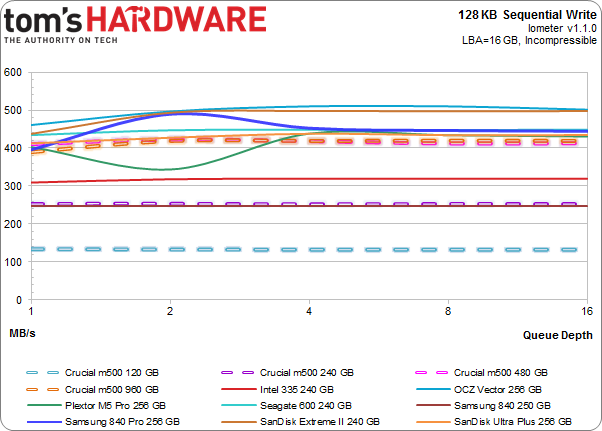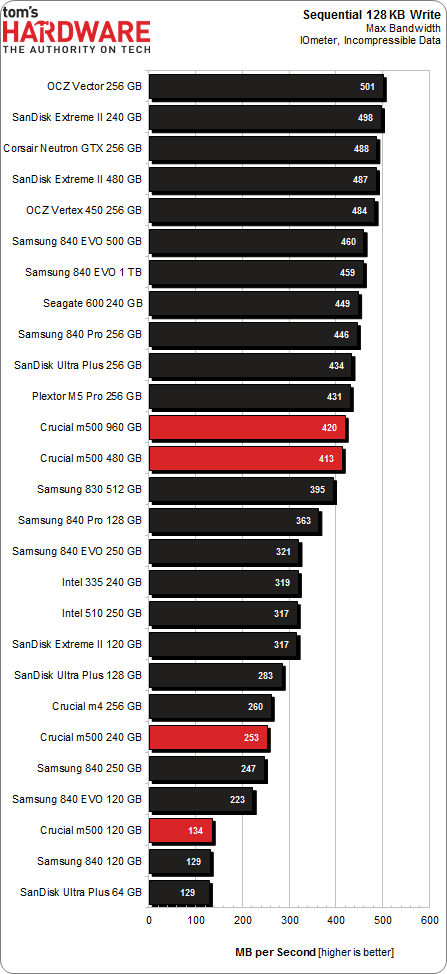SSD Deathmatch: Crucial's M500 Vs. Samsung's 840 EVO
Micron's consumer products division, Crucial, wasn't the first brand to introduce a 1 TB SSD. But it was the first to sell one for less than a fortune, and it sports some snazzy new features to boot. We got our hands on the entire line-up to test.
Results: 128 KB Sequential Write
128 KB Sequential Write
Unlike sequential reads, sequential writes tend not to scale according to queue depth. Writes are actually more dependent on the number of dies a given task can be spread across. For example, higher density means that the 120 GB M500 sports just eight dies, whereas the 128 GB m4 had 16. That explains why the two lower-capacity M500s trail the previous generation at their respective capacities.
We have a hard time making a big issue out of this, particularly when the larger models are so much quicker than their predecessors. The quickest m4 topped out near the 265 MB/s mark, while the larger M500s exceed 400 MB/s. The difference isn't earth-shattering, but it's difficult to imagine a desktop application where higher sequential writes might change the experience drastically.
We add in data from elsewhere in the consumer SSD space, and Crucial's larger M500s are up there in the action. It'd be an exaggeration to say that the Extreme II, 840 Pro, and OCZ Vector pistol-whip the 480 and 960 GB Crucial drives. However, a 100 MB/s lead in favor of OCZ's Vector does seem a little brutal. Now's probably a good time to mention that there are SSDs framed as mainstream and others marketed as performance-oriented. The M500 falls into the former category, while the Vector, 840 Pro, and Extreme II are categorically high-end drives where speed is concerned.
If we chart out the maximum observed 128 KB sequential write performance from Iometer, it becomes apparent that the 120 GB M500 is not stellar when it comes to writes. Neither is Samsung's 120 GB 840. Achieving half (or less) of the performance posted by two-bit-per-cell-based SSDs sporting similar capacity, the Crucial and Samsung models are particularly hobbled. One is hamstrung by TLC NAND, while the M500 is hurt by a move to higher-density 128 Gb flash.
The M500 and 840 butt heads again at 240 GB, where Crucial's margin of victory is just 8 MB/s. Samsung's 840 EVO is another matter entirely. Once its Turbo Write buffer runs out, though, it's back down to the regular 840's performance level.
Get Tom's Hardware's best news and in-depth reviews, straight to your inbox.
Current page: Results: 128 KB Sequential Write
Prev Page Results: 128 KB Sequential Reads Next Page Results: 4 KB Random Reads-
Someone Somewhere I think you mixed up the axis on the read vs write delay graph. It doesn't agree with the individual ones after, or the writeup.Reply -
Someone Somewhere Even 3bpc SSDs should last you a good ten years...Reply
The SSD 840 is rated for 1000 P/E cycles, though it's been seen doing more like ~3000. At 10GB/day, a 240GB would last for 24,000 days, or about 766 years, and that's using the 1K figure.
You're free to waste money if you want, but SLC now has little place outside write-heavy DB storage.
EDIT: Screwed up by an order of magnitude. -
cryan Reply11306005 said:I think you mixed up the axis on the read vs write delay graph. It doesn't agree with the individual ones after, or the writeup.
You are totally correct! You win a gold star, because I didn't even notice. Thanks for catching it, and it should be fixed now.
Regards,
Christopher Ryan
-
cryan Reply11306034 said:I would only buy SSD that uses SLC memory. I dont wan't to buy new drive every year or so.
Not only are consumer workloads completely gentle on SSDs, but modern controllers are super awesome at expanding NAND longevity. I was able to burn through 3000+ PE cycles on the Samsung 840 last year, and it only is rated at 1,000 PE cycles or so. You'd have to put almost 1 TB a day on a 120 GB Samsung 840 TLC to kill it in a year, assuming it didn't die from something else first.
Regards,
Christopher Ryan
-
Someone Somewhere I'd like to see some sources on that - for starters, I don't think the 840 has been out for a year, and it was the first to commercialize 3bpc NAND.Reply
You may be thinking of the controller failures some of the Sandforce drives had, which are completely unrelated to the type of NAND used. -
mironso Well, I must agree with Someone Somewhere. I would also like to see sources for this statement: "Yes, in theory they last 10 years, in practise they last a year or so.".Reply
I would like to see, can TH use SSD put this 10GB/day and see for how long it will work.
After this I read this article, I think that Crucial's M500 hit the jackpot. Will see Samsung's response. And that's very good for end consumer. -
edlivian It was sad that they did not include the samsung 830 128gb and crucial m4 128gb in the results, those were the most popular ssd last year.Reply -
Someone Somewhere You can also find tens of thousands of people not complaining about their SSD failing. It's called selection bias.Reply
Show me a report with a reasonable sample size (more than a couple of dozen drives) that says they have >50% annual failures.
A couple of years ago Tom's posted this: http://www.tomshardware.com/reviews/ssd-reliability-failure-rate,2923.html
The majority of failures were firmware-caused by early Sandforce drives. That's gone now.
EDIT: Missed your post. First off, that's a perfect example of self-selection. Secondly, those who buy multiple SSDs will appear to have n times the actual failure rate, because if any fail they all appear to fail. Thirdly, that has nothing to do with whether or not it is a 1bpc or 3 bpc SSD - that's what you started off with.
This doesn't fix the problem of audience self-selection
-
Someone Somewhere You were however trying to stop other people buying them...Reply
Sounds a bit like a sore loser argument, unfortunately.
SSDs aren't perfect, but they generally do live long enough to not be a problem. Most of the failures have been overcome by now too.
Just realised there's an error in my original post - off by a factor of ten. Should have been 66 years. -
warmon6 Reply11306841 said:I am not talking about Samsung SSD-s, I am talking about SSDs in general. And I am not going to provide any sources because SSD fail all the time after a year or so. That is the raility. You can find, on the internet, people complaining abouth their SSD failing. There are a lot of them...
Also, SLC based SSD-s are usually "enterprise", so they are designed for reliability and not performance, and they don't use some bollocks, overclocked to the point of failure, controllers. And have better optimised firmware...
Tell that to all the people on this forum still running intel X-25M that launched all the way back in 2008 and my Samsung 830 that's been working just fine for over a year.......
See what you're paying attention too is the loudest group of ssd owners. The owners that have failed ssd's.
See it's the classic "if someone has a problem, there going to be the one that you hear and the quiet group, isn't having the problem" issue.
Those that dont have issues (such as myself) dont mention about our ssds and is probably complaining about something else that has failed.


